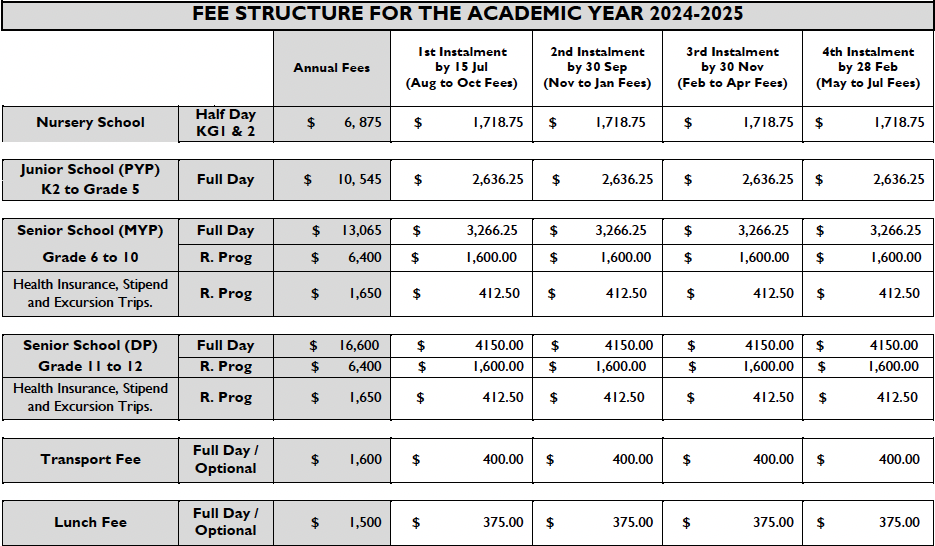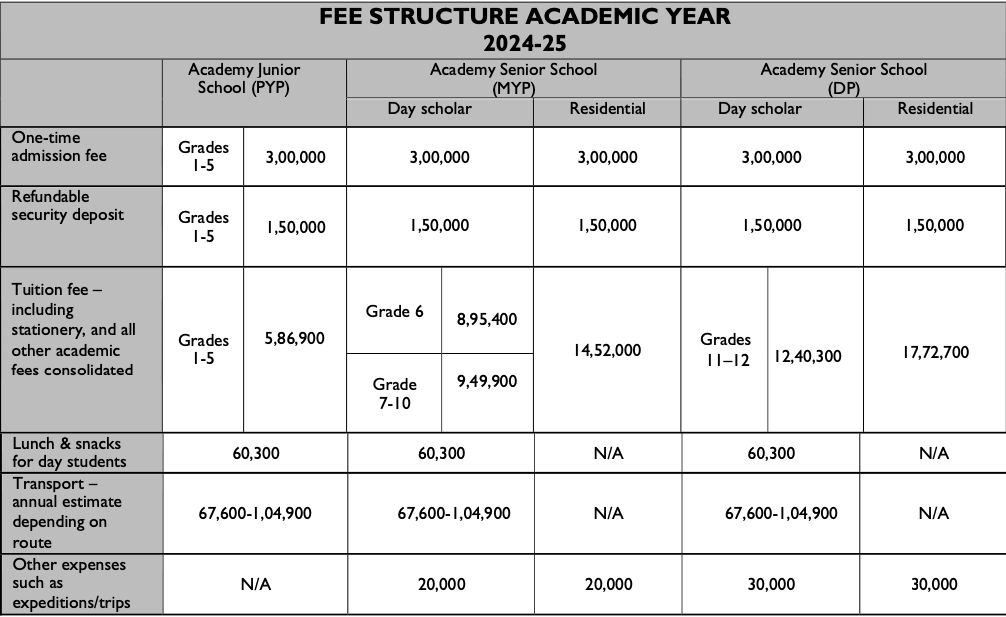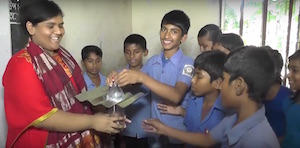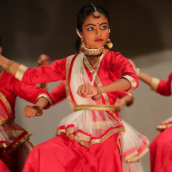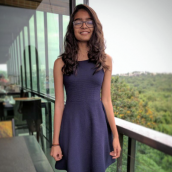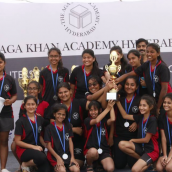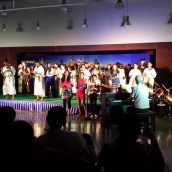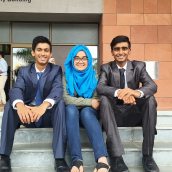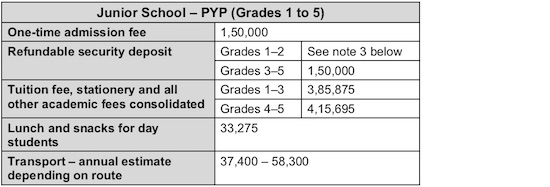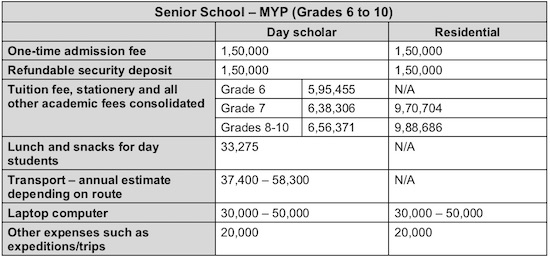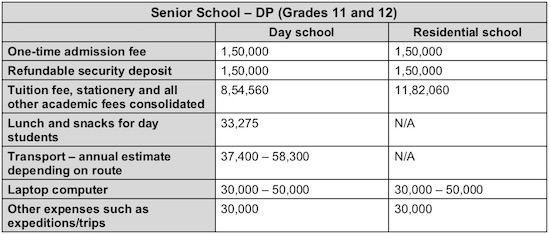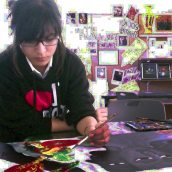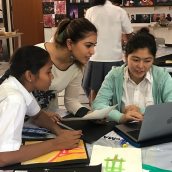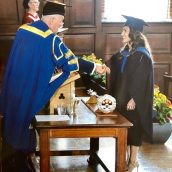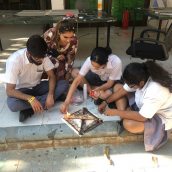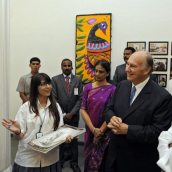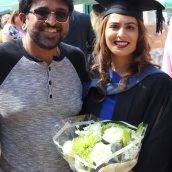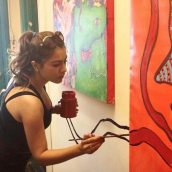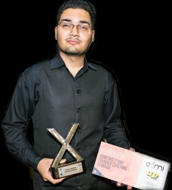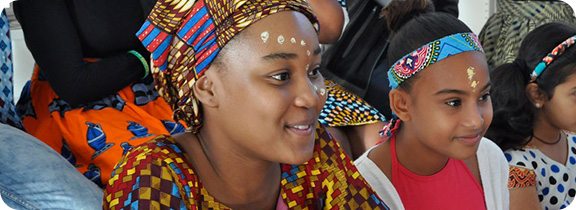
Fee Schedule
Fee schedule for the 2024-2025 academic year.
Click here to download the Academy's fee schedule for the 2024-2025 academic year.
1. One-time, non-refundable admission fee of USD 2,000 is payable for each student enrolling for the first time.
2. One-time, refundable security deposit of USD 1,500 is payable upon acceptance of admission. It is refundable when the student leaves the school as long as the required notice has been given in writing and “No Dues” clearance has been obtained from the school. No interest is paid or payable on this deposit.
3. A sibling discount of 5% of tuition fees will be applicable for second and subsequent children.
4. Tuition fees may be paid for a full year with an early-payment discount of 5%, if paid before 15 July.
5. Tuition fees may be paid in four equal instalments – first, no later than 15 July, second by 30 September, third by 30 November and forth by 28 February of each academic year.
6. A penalty of USD 50 shall be applied on the 1st of every month on any delayed payments made without agreement with the Finance Department. Unexplained delays shall make the students liable to suspension.
7. Tuition fees must be paid within 30 days of admission to secure a place at the Academy.
8. Tuition fees include course fees, the use of essential course books, library books, IT structure, science laboratory equipment, online education and certain classroom supplies.
9. Tuition fees do not include uniform costs.
10. Exam fees for the IB Middle Years Programme and the Diploma Programme will be billed separately based on the actual fee issued by the International Baccalaureate Organization (IBO).
11. Residential fees (USD $6400+$1650) include accommodation, food, health insurance, utilities, pocket allowance, transportation for in city excursions and community support visits.
12. The fees can be paid in US dollars or Mozambican metical. For payments in meticals, the invoice rate will be used. The Academy however reserves the right to change this policy.
13. Parents must provide the Finance Department (finance.maputo@agakhanacademies.org) with the proof of payment made through direct deposit or bank transfer, even if the payment is done by an organisation or a company.
14. If a student wishes to leave the school, one term’s advance notice of withdrawal must be given in writing or, in lieu of notice, one term of the annual fees will be due and payable. School clearance will not be possible until the fee account is settled in full.
15. The Academy reserves the right to withhold results, school leaving certificate, transcripts or any other information and/or document until all outstanding dues are settled in full.
16. Students who have been admitted to the Academy, and can demonstrate need, will be considered for financial aid.
17. The above terms and conditions may be modified, or new terms may apply to reflect changes in the law or our services.
18. For further information, please contact us via email at admissions.maputo@agakhanacademies.org.
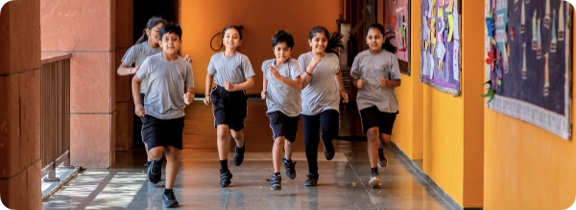
Fee Structure
Please click here to download the Fee Structure for the 2024-25 academic year.
NOTES:
- A one-time, non-refundable admission fee is payable for students enrolling for the first time. The admission fee must be paid to secure a place for a child at the Academy. This cannot be deferred or paid in instalments. The due date is one week after the offer has been accepted.
- A one-time refundable security deposit is also payable on acceptance of admission and should be paid together with the admission fee mentioned above. It is refundable when a student leaves the Academy as long as the required notice has been given in writing and “No Dues” clearance is obtained from the Academy. No interest is payable on this deposit.
- A sibling discount on a tuition fee of 5% will be applicable for second and subsequent children.
- The total fees for the academic year may be paid in full with an early-payment discount of 3% on or before 31 July 2024.
- The fee is payable on due dates as mentioned in the invoice/memo for the services.
- The Academy will charge a monthly surcharge of 2% on outstanding dues older than 30 days. In case the full fee that is due is not paid within one month period following the deadline, the student will not be allowed to attend classes or participate in other activities undertaken by the Academy.
- The Total Fee includes course fees, use of essential course books, library books, IT and science laboratory equipment and certain classroom supplies. The fees do not include uniform costs.
- Exam Fees for the IB Middle Years Programme and the Diploma Programme will be billed separately based on the actual fee issued by the International Baccalaureate Organization (IBO).
- Parents of returning students will be invoiced four to six weeks prior to the new Academic Year.
- The Academy does not accept cash for Fee payments. All payments must be made by Direct Bank Deposit, Bank Transfer, Cheque or Demand Draft even if the payment is being made by a third party such as a sponsoring organization. Parents must provide the Finance Office (finance@agakhanacademies.org), with a hard or an electronic copy of proof of payment showing the student's full name and the student identification number within 15 days of fund transfer for issuance of payment receipt. The absence of this information may delay crediting the fees reflected on your account in our system.
- Parents are responsible for ensuring that the fee payments are made into the correct bank account of the Academy. In the event of any change in bank account details, the changes will be communicated to parents in writing via official communication from the Academy with new payment bank details.
- If a student wishes to leave the Academy, one term’s advance notice of withdrawal must be given in writing, or one term’s worth of the annual fees will be due and payable. School clearance will not be possible until all outstanding dues are settled in full. Please refer to the points for withdrawal under number 12 in the PDF document above.
- The Academy reserves the right to withhold results, school certificates, transcripts or any other information and/or documents until all outstanding dues are settled in full.
- Admitted students, who demonstrate financial need and duly fill in and submit the application along with required supporting documents within the stipulated time, can be considered for Financial Aid. An independent Financial Aid Committee is responsible for reviewing and approving any request for Financial Aid by students.
- The above terms and conditions may be modified or new terms may apply to reflect changes in the law or our services. For further information, please contact us at admissions.hyderabad@agakhanacademies.org.
- Please note that the Fee Structure is subject to annual review.
Photography Workshop at AKA, Hyderabad
Award-winning photographer Fredric Roberts led a week-long workshop at AKA, Hyderabad for 20 students selected from the Academy and a local Aga Khan Foundation education programme. The students, and some of their teachers, learned professional techniques which they used to take pictures at the Academy and at nearby AKDN projects. See some of their pictures here.
Newsletter readers please click here to return to the newsletter (browser version)
Nanjiba Sayara: Teaching students in Bangladesh to recycle plastic
My desire was realised through the grade 10 International Baccalaureate (IB) Middle Years Programme (MYP) personal project, a community project that focuses on service learning through practical exploration and a cycle of inquiry, action and reflection. As part of my personal project, I went to a village school in Bangladesh where I taught a group of about 20 students how to recycle plastic bottles, and the importance of such an activity. I chose to focus on this, because recycling plastic is needed to keep our environment safe and it’s a fun activity that would keep the students interested. Please click here to see a video of my experience at the village school.
I was privileged to work with those students, as they were very enthusiastic to learn and contribute. Spending one day with children from different backgrounds made me a better communicator. My parents and I have always believed that extracurricular activities are as important as academics because they contribute to being a balanced individual. I am happy to have done this activity at the village school because it made learning enjoyable and therefore memorable.
The IB MYP personal project was challenging, educational and exciting. My parents always ask me to share my happiness and knowledge with others because it might brighten up someone’s day. I believe my session at the village school accomplished this, so I wish to continue sharing my knowledge, what I have learned and will continue to learn, with my society.
Anahita Aman: Grateful for the Academy’s holistic approach to learning and development
Anahita Aman is in her seventh year at the Aga Khan Academy in Hyderabad. Having started there in grade 5, she is now a grade 11 student in the Diploma Programme. She is wise beyond her years and yet has a youthfulness that is contagious. She is full of hopes and dreams and strives to get the most out of her days at the Academy so that she can ultimately give back to the community and society at large.
For Anahita, the strongest part of the Academy is its holistic approach to student development. “They don’t just focus on the academics but also on sports, music and art – so in that way it’s a really holistic approach to learning, and it’s helped me develop into a multidimensional and multifaceted person,” Anahita says. This holistic approach means that she gets the freedom to explore her passions, and that excites her. She loves music – whether it be singing, playing the keyboard and tabla, or learning Indian dance. She is also a self-proclaimed feminist who is passionate about gender-based violence, gender equality and education for girls. She recently had the chance to fuse these two passions as part of a personal project requirement at school. She wrote, composed, and performed her own songs with powerful messages on these topics.
This year, Anahita made a shift to the residential programme and says that it has been a great learning experience – one that has forced her to come out of her shell. She has learned how to better manage herself and her time, and she has become more independent and more social. “I learned how to adapt to my surroundings, how to adjust with other people and to make things work.” But Anahita feels that she has grown in other ways also, and this stems again from the holistic approach of the Academies.
“Service and action is mandatory as a part of the curriculum…they emphasise the need for community awareness, for concern about society, and they emphasise the need to give back and to make positive and effective contributions to society.” For the service and action component of the Academy’s programme, Anahita was part of fundraising teams that raised money for nearby government schools to install water filtration systems and purchase sports equipment, among other things. “We don’t look at it as an obligation or a compulsion but we do it out of passion, and the Academy gives us that passion, that feeling or need to give back to society,” Anahita says. She is proud of her service accomplishment along with many others that the Academy has also helped her to achieve.
She is a member of the journalism club and has made great strides in her writing skills, including how to better articulate her thoughts. She has taken part in a national sports tournament where she represented her school in football and track and field, having won a silver in high jump. And she has been part of the Model United Nations where she not only got a real sense of how the world works, including how people live and what the prevalent issues are, but also developed skills in public speaking, problem solving and knowledge application. Anahita says, “The Academy helps us apply this knowledge to real-life situations.”
The holistic approach to learning and development that the Academy takes is something that Anahita believes makes it unique. But there are other things too. For one, there is no spoon-feeding. Instead, you’re taught how to learn and how to learn on your own – the approach is not one of rote learning but rather application of real-life situations. She’s also really happy that the Academy creates a safe space. “We have that sense of comfort that there’s no pressure of performing and we have the space to experiment with things. We don’t feel pressure at any point, we don’t feel stressed, and we don’t look at exams as huge challenges but as small barriers that we can overcome.”
Anahita also believes that the Academy’s mission and vision are both important and inspiring. In fact, it was the mission that attracted her parents to send her there. “It teaches us to be culturally rooted and diverse. It teaches us how to accept our differences and so we have this feeling of community,” says Anahita. The Academy also aligns within the framework of the International Baccalaureate (IB) programmes. As such, the attributes of its learner profile are very powerful in instilling life values. All of this is what she believes make it distinct from many other schools.
Anahita credits the Academy for helping her become less shy and less self-conscious. She says, “I feel like I have the comfort to be who I am and to express myself freely. I feel acknowledged and I feel I’m being appreciated for who I am.” When asked if there was any particular person at the Academy that played a big part in this, or whether there was someone she really looks up to, she says that she doesn’t account only one person as a role model but instead looks to the many amazing people she has met along the way for their different but equally important attributes. “I may like someone’s enthusiasm, someone’s hard work and dedication, the way they work with people, the way they bring people together,” Anahita says. “I like to get inspired by these characteristics, by these attributes from different people and imbibe them into myself to be the best person I can be.”
Anahita’s future looks bright. While she is still unsure of what exactly she wants to do, she has learned how to articulate her passion, and that in itself has given her a sense of determination. She hopes to be able to combine her interests in music and literature with humanities and gender studies. She imagines perhaps becoming a poet or musician and incorporating important messages into her work. “I think the Academy is giving me the space and the platform to explore what I’m actually interested in,” Anahita says, “and I think that will lead me to my ultimate ambition.”
By Ceisin Popat
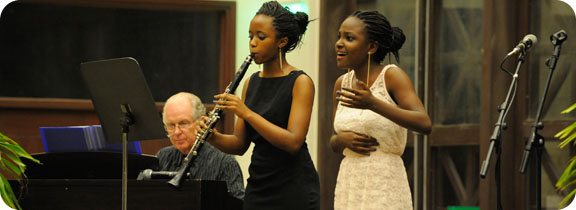
Student Projects
"What students know is no longer the most important measure of an education. The true test is the ability of students and graduates to engage with what they do not know, and to work out a solution."
– His Highness the Aga Khan
Our goal is to instil in each student the desire to acquire knowledge as part of a balanced, lifelong process of inquiry. This, in turn, leads to their intellectual and personal growth.
In addition to mastering core subjects, our students acquire the skills, worldview, integrity and confidence to adapt to new challenges. To help students develop these skills, we encourage them to pursue projects in their classrooms based on sound inquiry, careful analysis and informed research.
Practical problem solving
We offer Product Design as well as Digital Design within the umbrella of Design as prescribed by the International Baccalaureate Middle Years Programme. These courses are designed to teach students the skill of problem solving, both real and perceived. In the early years, a guided approach is used with more or less generic solutions. In later years, students explore possibilities based on the needs of clients and emergent target reach. As part of the requirements, students create a physical solution while taking into consideration the properties of the materials they employ.
Students follow a problem-solving process, which includes:
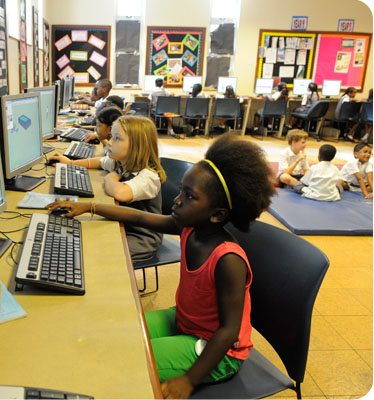
- Analysing the problem
- Designing a solution and producing specifications of a product to address the need
- Developing various designs and rating them based on the specifications
- Developing and implementing a plan for production of the design selected
- Evaluating the product for use and functionality
Students are also expected to provide supporting written documentation.
Dania Quadri (Class of 2014): Giving back as an alumna
“Being part of an open-minded community that encouraged challenging what we were taught, the willingness to accept one another and inspire each other to grow constantly, was very refreshing. I credit these experiences for much of whom I am today.”
– Dania Quadri, Class of 2014
She was also instrumental in helping to organise the Mental Health Awareness Week (MHAW) in September 2016.
“As I aspire to be a doctor, I feel that it is necessary to acquire experience in a role that demands care, patience and a great deal of understanding,” she explains. “I knew teaching and organising the MHAW would contribute to my personal growth and career aspirations but it would also allow me to give back to my school – something very important to me.”
Through MHAW, Dania was able to contribute to reducing the stigma associated with mental illness within the Academy community.
“As a student myself, I know how hard it is for students who are mentally unwell to cope with studies and social life at school," she said. "I wanted to spread awareness about it being perfectly normal to feel mentally unwell, to know the difference between clinical illness and just a rough emotional phase, and to encourage students to seek help and advice if they are feeling low.”
Her internship made her realise she was more passionate about education than she thought. She particularly enjoyed the responsibility an educator has in developing a student’s personality and knowledge.
“As a teacher, it was interesting to observe school from the other side," she said. "Spending time with all the teachers made me realise how much they actually care for their students. The support is incredible at the Academy and different learning abilities are not only understood but truly valued.”
Fee schedule test
Fee schedule for the 2018-2019 academic year.
![]() Aga Khan Academy Hyderabad Fee Schedule - 2018-19.pdf
Aga Khan Academy Hyderabad Fee Schedule - 2018-19.pdf
Notes
1 A one-time non-refundable admission fee is payable for students enrolling for the first time. The admission fee must be paid to secure the place for a child at the Academy. This cannot be deferred or paid in instalments. The due date is one week after the offer has been accepted.
2 A one-time refundable security deposit is also payable on acceptance of admission and should be paid together with the admission fee mentioned above. It is refundable when a student leaves the Academy as long as the required notice has been given in writing and “No Dues” clearance is obtained from the Academy. No interest is payable on this deposit.
3 Grade 1 & 2 students will have option to pay refundable security deposit in two instalments. First instalment of Rs. 75,000 when they enter grade 3/4 and second instalment when they enter grade 5/6.
4 A sibling discount on tuition fees of 15% will be applicable for second and subsequent children.
5 Tuition fees for the academic year may be paid in full with an early-payment discount of 3% on or before 31 July. This discount is applicable on the net amount payable after other discounts have been deducted.
6 Tuition fees are payable in two equal instalments, no later than 31st July and 15th December of each academic year. For DP2 (grade 12) students the due date for the second instalment is 15th November.
7 For new admissions to an academic year the tuition fees must be paid within 30 days of admission to secure a place at the Academy.
8 The Academy will charge a monthly sur-charge of 2% on the total outstanding dues older than 30 days. In case the fees are not paid within one month’s period following the deadline, the student will not be allowed to attend classes or participate in other activities undertaken by the Academy.
9 Tuition fees include course fees, use of essential course books, library books, IT and science laboratory equipment and certain classroom supplies. The fees do not include uniform costs.
10 Exam fees for IB Middle Years Programme and the Diploma Programme will be billed separately based on the actual fee issued by the International Baccalaureate Organization (IBO).
11 Parents of returning students will be invoiced four to six weeks prior to the new academic year.
12 The Academy no longer accepts cash for fee payments. All payments must be made by direct bank deposit, bank transfer, cheque or demand draft even if the payment is being made by a third party such as a sponsoring organization. Parents must provide the finance office (finance@agakhanacademies.org), with a hard or an electronic copy of proof of payment showing the full name of the student and the student identification number within 15 days of fund transfer for issuance of payment receipt. Absence of this information may delay crediting the fees reflected on your account in our system.
13 Parents are responsible for ensuring that the fee payments are made into the correct bank account of the Academy. In the unlikely event of any change in bank account details, the changes will be communicated to parents in writing via a hand delivered letter from the Academy.
14 If a student wishes to leave the Academy, one term’s advance notice of withdrawal must be given in writing or one term’s worth of the annual fees will be due and payable. School clearance will not be possible until any outstanding dues are settled in full.
15 The Academy reserves the right to withhold results, school certificates, transcripts or any other information and/or documents until all outstanding dues are settled in full.
16 Admitted students, who demonstrate financial need and duly fill in and submit the application along with required supporting documents within the stipulated time, can be considered for financial aid. An independent financial aid committee is responsible for reviewing and approving any request for financial aid by students.
17 The above terms and conditions may be modified or new terms may apply to reflect changes in the law or our services. For further information, please contact us at admissions.hyderabad@agakhanacademies.org.
18 Please note that fee structures are subject to annual review.
Taniya Dharani - alumna returned as visual arts fellow
“The Academy has made me the person I am today,” she says. “I wanted to give back to the Academy what it has given me.” After graduating from the Diploma Programme, Taniya went on to pick up a Bachelor of Arts from the University of Reading, England. In her current role at the Academy, Taniya wants to help visual arts students prepare for university level art courses. It’s also on her agenda to introduce art students to careers in their field that they might not have considered.
“I want to help give our Diploma Programme art students theoretical practice that will be useful at university,” she says. “I also want to help visual art students understand what opportunities the art world outside holds for them; artistic pathways they can opt for including business and law options in sectors that not everyone is aware of.”
Though she has her task laid out in front of her, returning to the Academy in her new role is understandably strange for Taniya. “I still feel like a student at heart,” she says. “But I’ve learnt to act like a teacher and take responsibilities.” Taniya understands that her experience as a student at the Academy puts her in a unique place of understanding in her current role as teacher. “I feel privileged to have the opportunity to see Academy life from a different light this time. Now I understand the day to day challenges teachers face, as well as the hardships of student life.”
Taniya fondly remembers her time as a student at the Academy. When she graduated, Taniya was the only student in the visual arts department. “I really enjoyed visual arts in school. Being the only student, I had the entire art studio and Ms. Meenakshi to myself.” She is referring to Meenakshi Joshi, who is now MYP coordinator in the Senior School. She also remembers history classes with Koel Ray, and service opportunities at old age homes and government schools that taught her humility and empathy.
However, her most cherished memory at the Academy is meeting His Highness the Aga Khan. At the inauguration ceremony of the Academy in 2014, Taniya had the opportunity to show and discuss her art work with HH. “It was the most precious gift that I ever received and a memory that has helped me hold onto my passion.”
In her personal life, Taniya cites her father as her source of inspiration. It is a common trope that parents discourage their children from pursuing a career in the arts, but this wasn’t the case for Taniya. “Despite people not understanding my passion for painting, he [Taniya’s father] always stood by me and helped me achieve my goals,” she says. Taniya is also proud of her father’s efforts in community service and the life he has led. “His struggles and achievements inspire me. It makes me want to do great things.”
“Growing up I realised that the only thing that ignited a fire in me was holding a paintbrush in my hands and dropping paint all over my clothes. It made me feel like all is well in my world, even when almost everything in life was falling apart.” Taniya is in some ways a time capsule from the Academy’s early years, and like a time capsule, she reminds us of things that have changed, and also about the things that have remained the same.
Written by Ajay Sundaram
Kashyap Gohel (Class of 2011): Providing solutions to improve the world
Kashyap Gohel has been pursuing a Bachelor of Architecture programme at the Jomo Kenyatta University of Agriculture and Technology (JKUAT) in Nairobi, Kenya since graduating from the Aga Khan Academy Mombasa in 2011. "My top marks at the Aga Khan Academy earned me a government scholarship which is about 85% of the annual fees for my architecture course of six years," says Kashyap very proudly. He expects to graduate from JKUAT in June 2017.
"I think the main values the Academy instilled in me were positive attitude, time management, assertiveness, competitive spirit and self-confidence. These are values that I apply on a day-to-day basis to form the foundation of a successful career in art, product design and architecture," Kashyap says confidently. He also adds that the confidence that his skill set gives him takes him further than most in trying challenging and new projects in his field. With this experience in mind he says, "I am sure I shall be quite a pioneer in creating world-changing ideas."
Kashyap believes the coursework at his university and his time management are going smoothly due to the intense training at the Aga Khan Academy. "Coming from the Academy, I believe it set me a level ahead of others, enabling me to go further than my fellow students." He also values the International Baccalaureate curriculum. "It is the only system that I know of that makes it possible for one to develop holistically. One does not just learn academics, but also extracurricular activities, leadership skills, developing talents and solving community problems," he says emphatically.
Since graduating from the Aga Khan Academy, Kashyap has participated in many major events and activities that have brought him recognition and accolades. He was a winner of the Perstorp Open Innovation Challenge 2016 in Sweden which involved submitting ideas on making, repairing and remolding furniture into new shapes and designs rather than disposing of used or broken pieces in landfills. Kashyap has also won the Disruption by Design Award for architectural design in 2015. Other accomplishments include being awarded a tender to create a 14-foot-tall carving at Jomo Kenyatta International Airport in Nairobi, Kenya in 2014 and winning the first round of the Thought for Food Challenge 2013 – an annual competition that challenges university students to develop an innovative solution to improve food security. He also won an international graphic design contest for an Irish boat-making company and has displayed his artwork at Diani Beach Art gallery, Tazama Art Gallery and Kenya Art Fair.
Kashyap was also nominated and sponsored to attend the One Young World conferences in Pittsburgh, USA in 2012, and in Johannesburg, South Africa in 2013. These summits gather the brightest young leaders from around the world, empowering them to make lasting connections and develop solutions to some of the world's most pressing issues.
Kashyap is particularly proud of his first community service project, called Project Desert Farms. He designed this as an architectural solution to help communities on the coast to filter ocean water, obtain housing and food, and reduce deforestation. This project was selected as a finalist project from a worldwide participation of 140 teams, and the only one in Africa that made it to the Thought for Food Global Summit in Berlin, Germany.
While at the Aga Khan Academy Mombasa and after graduating in 2011, Kashyap has been actively involved in many projects and volunteer activities and has also worked for the Academy and other companies in his field. In 2011 he worked with planning and construction management at the Aga Khan Academy. He also volunteered there as a theatre teacher for years 7–10 in 2012 and was involved in the design of two of the Academy’s residential blocks.
Kashyap's most unforgettable experience at the Academy was being a dorm captain in the residential programme. "One of the things I miss about the Academy is the organisation…[and the] efficient order in the way it operates," he comments. Another thing he misses about the Academy is the facilities. "It’s only after leaving the Academy that you appreciate the constant high speed Wi-Fi, adequate number of desks and chairs for students, high-class sports facilities and equipment, and most of all the great ocean climate and friendly people. As they say, nothing beats home," Kashyap reminisces nostalgically.
